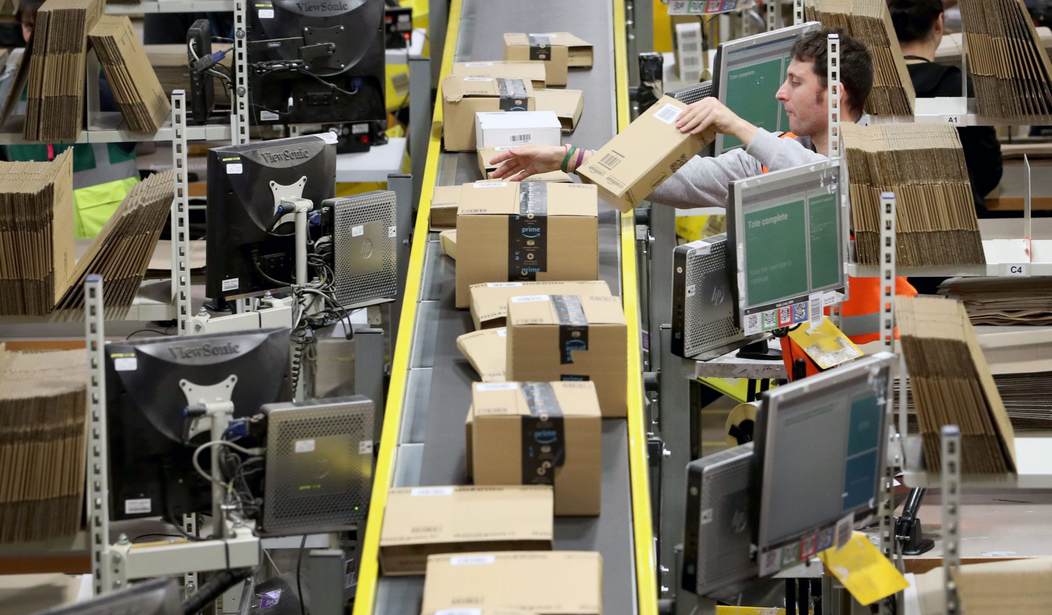Christian Sewing, president of Deutsche Bank, knows he should be worried about Amazon and Google. Sewing also told the Euro Finance Conference Nov. 13 that losing customers to those companies would be the “worst” scenario that Deutsche Bank could face in its future.
Karen Miles, Obama administration administrator for small businesses, said Sewing and other traditional bankers need to worry about losing small-business lending deals to so-called “platform” companies like Amazon and Google.
“I think they are going to dominate the market, and that is the next phase that’s coming,” she told the October LendIt Europe financial technology conference in London.
Miles said platform companies, like Amazon, could become forces with which traditional bankers will have to reckon in the next 12 to 18 months.
“But the question is, in what form would that come,” Miles said, “and… under what regulatory authority?”
Miles and Sewing are just two of the voices sounding an alarm in the financial industry’s wilderness.
McKinsey & Co., in its annual banking report, warned traditional bankers could lose as much as 40 percent of their revenue by 2025 to “platform companies” like Amazon.
The fear is that Amazon will do to banking what the company has already done to just about every other retail industry on the planet, from books to music and now to the grocery business with its acquisition of Whole Foods.
“There is a new heavyweight competitor in town. ‘Platform’ companies such as Alibaba, Amazon, and Tencent are staking a claim to banks’ customers and the revenues and profits they represent,” the McKinsey report authors wrote.
The first advantage the platform companies such as Amazon possess is access to an incredible treasure trove of digital customer data. What could there possibly be that Amazon or Google don’t know about you?
But McKinsey also warned Amazon, and the other platforms, are also “more central in the customer journeys” than traditional banks. In other words, Amazon, Google, Alibaba, etc. are part of our lives in a way that bankers are not.
“By creating a customer-centric, unified value proposition that extends beyond what users could previously obtain, digital pioneers are bridging the value chains of various industries to create ‘ecosystems’ that reduce customers’ costs, increase convenience, provide them with new experiences, and whet their appetites for more,” the McKinsey report noted.
As Crowdfund Insider pointed out, small-business owners have always had trouble getting bank loans. Simple arithmetic explains the problem. If it costs Deutsche Bank effectively as much to make a $100,000 loan as it does to lend $1 million, it’s obvious which customer the bank will choose.
Peeyush Nahar, Amazon vice president for Amazon Marketplace, told Reuters in June that the tech giant had already lent more than $1 billion in small-business loans to more than 20,000 merchants in the United States, Japan and the UK in 2016-2017.
But so far, Amazon is only lending to retailers who are selling product via the Amazon website.
Amazon Lending offers $1,000 to $750,000 short-term business loans to help businesses grow on Amazon. Of course, that benefits Amazon because the company takes a percentage of everything sold on its website.
Nahar said the merchants had used the money to expand their inventory or discount what they are selling via Amazon.
“Small businesses are in our DNA. Amazon is providing capital to small businesses to help them expand inventory and operations at a critical period of their growth,” Nahar said. “We understand that a small loan can go a long way.”
Such a financial revolution could also change the world of financial regulation. Since the 18th century, there has always been a wall of government rules that kept the banking and retail industries apart.
Keith Noreika, acting head of the Office of the Comptroller of the Currency, told Bloomberg it might be time for that to change.
He said financial regulators should be more concerned about economic growth than maintaining the separation between banks and retailers.
“Such dogma props up bureaucracies that maintain the separation and serves the interest of the status quo without regard to why the separation exists in the first place or whether the separation has any usefulness for today’s economy,” Noreika said.
The result, according to Karen Mills, could be something akin to a small-business lending utopia.
“If you know everything a customer has purchased, you understand your customer better. That is like gold,” said Mills. “They know everything about you, and they can turn that into something that is helpful for the small business.”









Join the conversation as a VIP Member